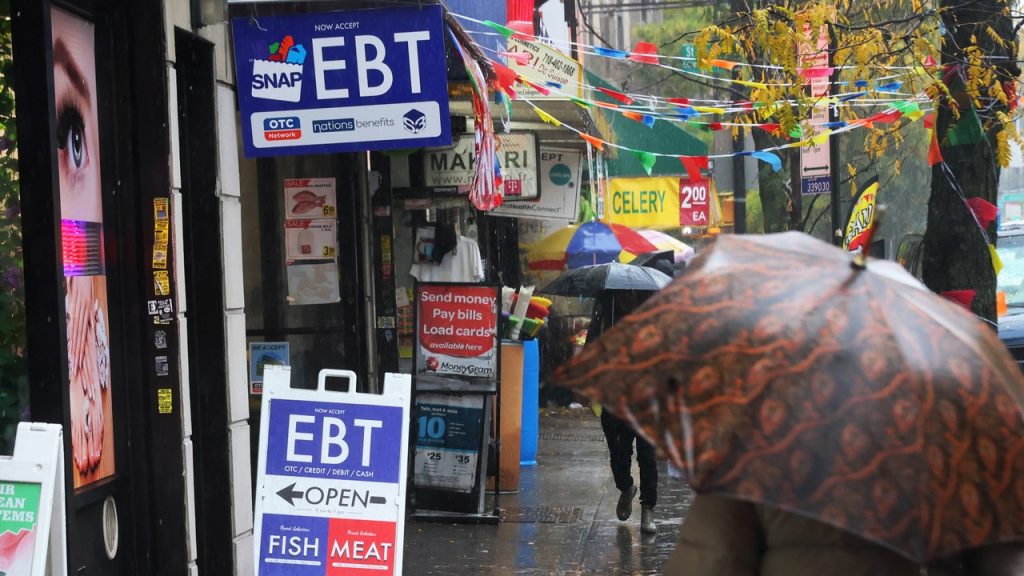Listen to the article
A federal judge in Rhode Island delivered a stern rebuke to the Trump administration on Thursday, ordering officials to fully fund the Supplemental Nutrition Assistance Program (SNAP) by Friday after they had proposed to cover only 65% of November’s benefits.
U.S. District Judge Jack McConnell expressed frustration with the administration’s failure to comply with his previous order issued last week, which required the U.S. Department of Agriculture to maintain funding for the program before its funds were scheduled to expire on November 1.
“People have gone without for too long,” McConnell stated during the court proceeding. “It’s likely that SNAP recipients are hungry as we sit here.”
The judge’s decision comes at a critical moment for SNAP, which serves approximately 42 million low-income Americans. November 1 marked the first time in the program’s 60-year history that payments were halted, creating unprecedented uncertainty for vulnerable households across the country.
The Trump administration had filed court documents earlier this week proposing to pay just 65% of the roughly $9 billion required to fund SNAP for November. This partial funding plan prompted McConnell to update his original order, giving officials just 24 hours to comply with full funding requirements.
In his ruling, McConnell also addressed a significant concern regarding benefit distribution, noting that the administration had failed to resolve known issues that could cause SNAP payments to be delayed for weeks or months in some states. He directed the USDA to utilize contingency funds as needed to ensure timely payments.
“The evidence shows that people will go hungry, food pantries will be overburdened, and needless suffering will occur,” McConnell emphasized. “That’s what irreparable harm here means.”
The SNAP program represents one of the nation’s most extensive safety net initiatives, providing critical food assistance to millions of low-income individuals and families. The program’s benefits are distributed through Electronic Benefit Transfer (EBT) cards that recipients can use at authorized retailers to purchase eligible food items.
The funding disruption has raised alarms among anti-hunger advocates and social service organizations, many of which had already reported increased demand at local food banks and pantries as SNAP recipients faced uncertainty about their benefits.
For the retail sector, particularly grocery stores in low-income communities, the SNAP funding pause threatened significant revenue impacts. Many smaller grocers and neighborhood markets depend heavily on SNAP purchases, which can represent a substantial portion of their total sales.
This legal battle over SNAP funding comes amid ongoing tensions between the Trump administration and anti-poverty advocates regarding the administration’s approach to social safety net programs. Critics have pointed to previous policy proposals aimed at tightening SNAP eligibility requirements and reducing overall program spending.
The case highlights the critical role federal courts play in adjudicating disputes over essential government services during periods of administrative transition or policy shifts. Judge McConnell’s urgent action underscores the judiciary’s authority to intervene when fundamental needs of vulnerable populations are at risk.
As the Friday deadline approaches, attention will focus on whether the administration fully complies with the court’s order and how quickly benefits can be restored to those who rely on the program for basic nutrition.
Fact Checker
Verify the accuracy of this article using The Disinformation Commission analysis and real-time sources.




9 Comments
This is a welcome ruling to restore full SNAP funding. Millions of vulnerable Americans rely on this program to put food on the table. The administration’s proposal to pay only 65% was unacceptable and would have left many families struggling to get by.
While I’m glad the full SNAP funding will be restored, it’s troubling that the administration sought to cut it in the first place. This program should not be subject to political gamesmanship – it’s a vital public service that helps feed millions of Americans.
It’s concerning that this marks the first time in SNAP’s 60-year history that payments were halted. This program is a lifeline for millions, and the uncertainty this created for vulnerable households is unacceptable.
I agree. SNAP is a critical program that helps ensure low-income families have access to nutritious food. The administration’s actions threatened the food security of millions, and this ruling is an important step in restoring that.
This is an important victory for SNAP recipients and the communities that rely on the program. The judge’s strong language underscores the urgent need to maintain full funding for this essential food assistance program.
This is an important victory, but the underlying problem of food insecurity in the US remains. Policymakers should use this as a springboard to explore ways to strengthen and expand SNAP and other food assistance programs to better serve those in need.
The judge is right to express frustration with the administration’s failure to comply with the previous order. SNAP recipients should not have to go without essential food assistance, especially during these challenging economic times.
Absolutely. No one should have to go hungry in the wealthiest country in the world. This decision sets an important precedent for protecting vital social safety net programs.
The judge’s order is a welcome development, but the larger issue of food insecurity in the US needs to be addressed. SNAP is just one piece of the puzzle – we need a comprehensive strategy to ensure all Americans have access to affordable, nutritious food.